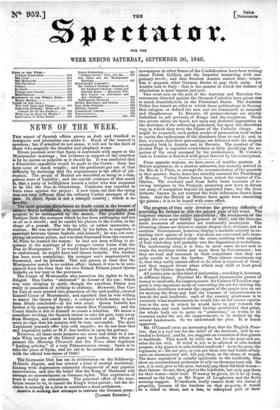TheGermanic Diet has sat in deliberation on the Schleswig- Holstein
dispute, and has uttered a kind of neutral resolution; hinting with deprecatory solemnity disapproval of any popular intervention, and also the belief that the King of Denmark will attempt no encroachment on German rights. This expression of trust is really an adMonition. The practical effect of the reso- lution seems to be, to cancel the Kings letter-patent ; but the de- cision is scarcely in aforna to constitute a final settlement. Austria is making new attempts to restrain the German press :
newspapers in other States of the Confederation have been writing about Polish Gallicia and the Imperial tampering with san- guinary revolt; and that freedom Austria cannot bear; where- fore it requests other German States to gag their press. Let Austria look to Italy : that is the quarter in which the defence of Absolutism is most urgent just now.
Two overt acts on the part of the Austrian and Bavarian Go- vernments directed against the German Catholics have given rise to much dissatisfaction in the Protestant States. The Austrian Police has issued an edict in which thosepublications in Saxony that eulogize or defend the new sect are denounced as immoral and blasphemous. In Bavaria, all picture-dealers are strictly forbidden to sell portraits of Rouge and his coadjutors. These two severe edicts are based, not upon any declared impropriety in the doctrines of the reforming preachers, but upon the irreverent way in which they treat the claims of the Catholic clergy. As might be expected, such paltry modes of persecution tend rather to excite the enthusiasm of the dissidents than to cool it; and, in fact, we learn that their proceedings are followed with the deepest sympathy both in Austria and in Bavaria. The conduct of the present Pope is regarded everywhere as fully justifying the re- jection of the sway assumed by his predecessors. M. Cerski's visit to London is watched with great interest by his countrymen.


























